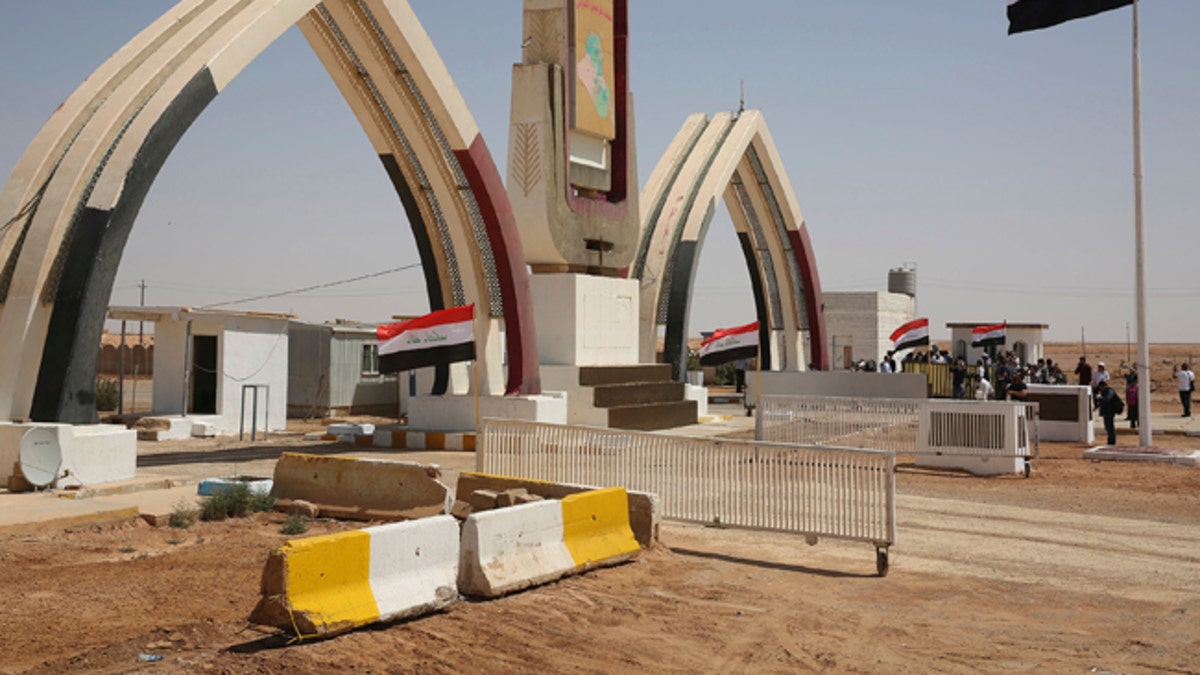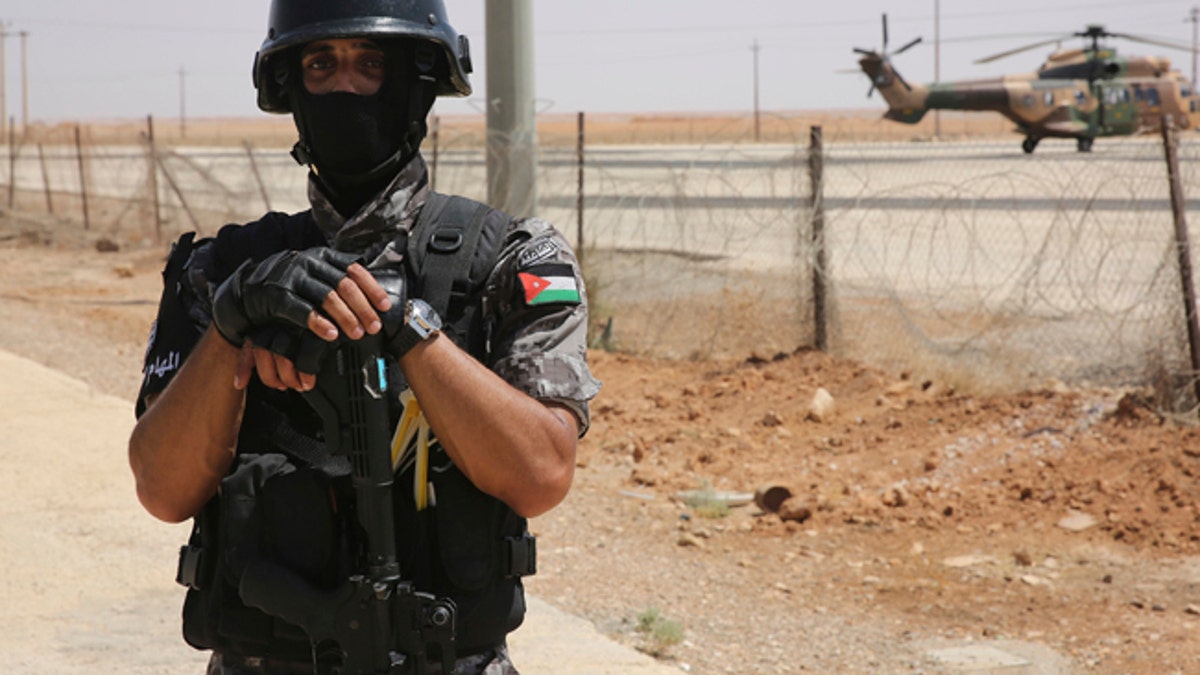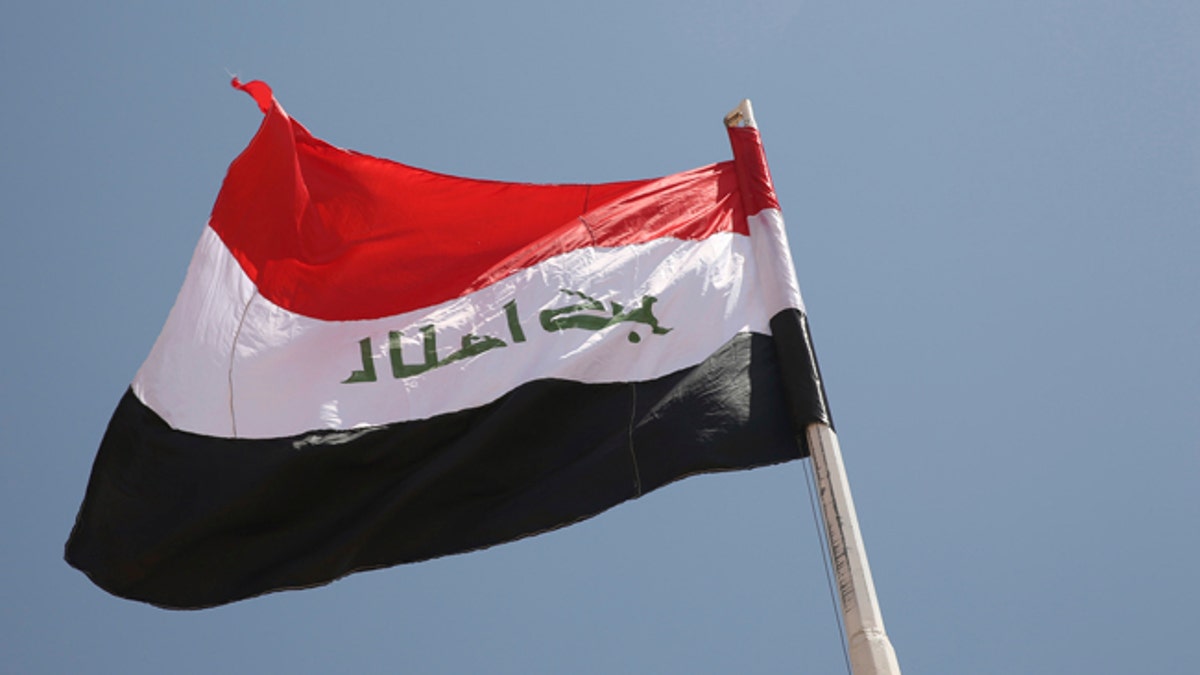
Iraqi flags fly at the recently opened Iraqi Trebil border crossing on the Iraq-Jordan border on Aug. 30, 2017. (AP)
TREBIL BORDER CROSSING, Iraq – Jordan and Iraq reopened their only border crossing Wednesday after a two-year closure, taking a step toward stabilizing an area devastated by Islamic State extremists and allowing for a resumption of vital trade.
Iraqi and Jordanian officials celebrated the reopening as another victory over the militant group, which has been pushed back by U.S-backed military offensives in northern and western Iraq over the past year.
Ending the closure "means we have told the world we are greater ... than any terrorist group," Iraq's interior minister, Qassim al-Araji, said in a ceremony on the Jordanian side of the border post.
Reviving cross-border traffic could help bring normalcy back to Iraq's Anbar border province after years of heavy fighting to drive IS militants from its towns and cities. It would also give a boost to Jordan's sluggish economy. Iraq is a key market for Jordan, and exports dropped by more than two-thirds after the 2015 closure.
ISIS PUTS UP TOUGH RESISTANCE OUTSIDE TAL AFAR, IRAQI MILITARY SAYS

A Jordanian soldier stands guard the Iraq-Jordan border on Aug. 30, 2017. (AP)
Jordanian and Iraqi officials did not set a firm date for the resumption of truck and passenger traffic across the border post, known in Jordan as Karameh and in Iraq as Trebil. The crossing sits along a 900-kilometer (560-mile) trade route linking Jordan's capital, Amman, and Iraq's capital, Baghdad.
Iraqi officials said Wednesday that the highway linking the border with Baghdad is safe, with security provided by Iraqi troops since late last year. Still, IS militants have launched several lethal attacks on troops stationed there or traveling on the highway to nearby towns.
In the future, a private international security firm, Olive Group, is to rehabilitate the highway and the crossing point, said the governor of Anbar province, Mohammed al-Halboosi.
He said negotiations between the Iraqi government and the contractor are ongoing, and that one of the remaining issues is whether the contractor will also provide security along the highway.
"I think we can move (forward) from now" with truck traffic, he told The Associated Press. "But we must make a plan ... to protect the road from any Daesh movement," he said, using the Arabic acronym for IS.

An Iraqi flag waves in the wind above the Iraqi Trebil border crossing. (AP)
On Wednesday, journalists had their passports stamped by Jordanian border officials before heading to the Iraqi side.
DISPUTED IRAQI PROVINCE TO VOTE ON KURDISH INDEPENDENCE
Along the way, several disabled trucks sat by the side of the road, apparently stranded there since the closure. Iraqi border officials still weren't ready for a reopening, initially collecting passports of journalists to stamp them, but then handing back the documents and saying it was not possible at this time.
After the Islamic State group's swift territorial grabs in Iraq in 2014, the militants controlled large areas between Trebil and Baghdad, enabling them to impose taxes on cargo trucks driving through their territories. The crossing was closed by Iraqi authorities in July 2015 to deprive the militants of such income.
Iraq used to ship 10,000 to 12,000 barrels a day of oil to Jordan by truck, which sold at preferential rates. The Iraqi shipments made up about a 20th of energy-poor Jordan's daily needs.
Before the IS land grabs, Jordan exported about 1 billion Jordanian dinars ($1.4 billion) to Iraq each year. By 2016, this had dropped to 300 million Jordanian dinars ($424 million), with goods shipped via a longer route through Saudi Arabia. Exports include agricultural produce and plastics.
Hundreds of factories in Jordan closed as a result of the border closure.
Jordan's fragile economy suffered other serious setbacks, including the spillover from Syria's civil war. Jordan's trade crossing with Syria was closed in the spring of 2015, and remains shuttered.
As a result, Jordan has suffered sluggish growth of just 2 percent in 2016, below the regional average. Unemployment climbed to 18.2 percent in the first quarter of 2017, including about 35 percent among college graduates.
